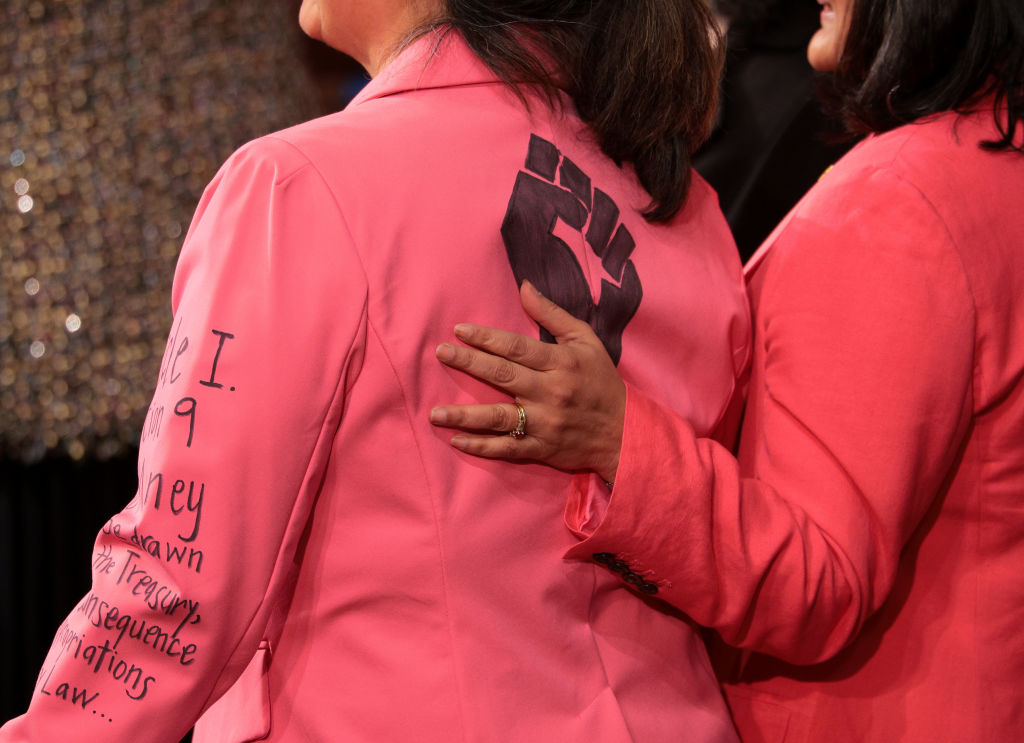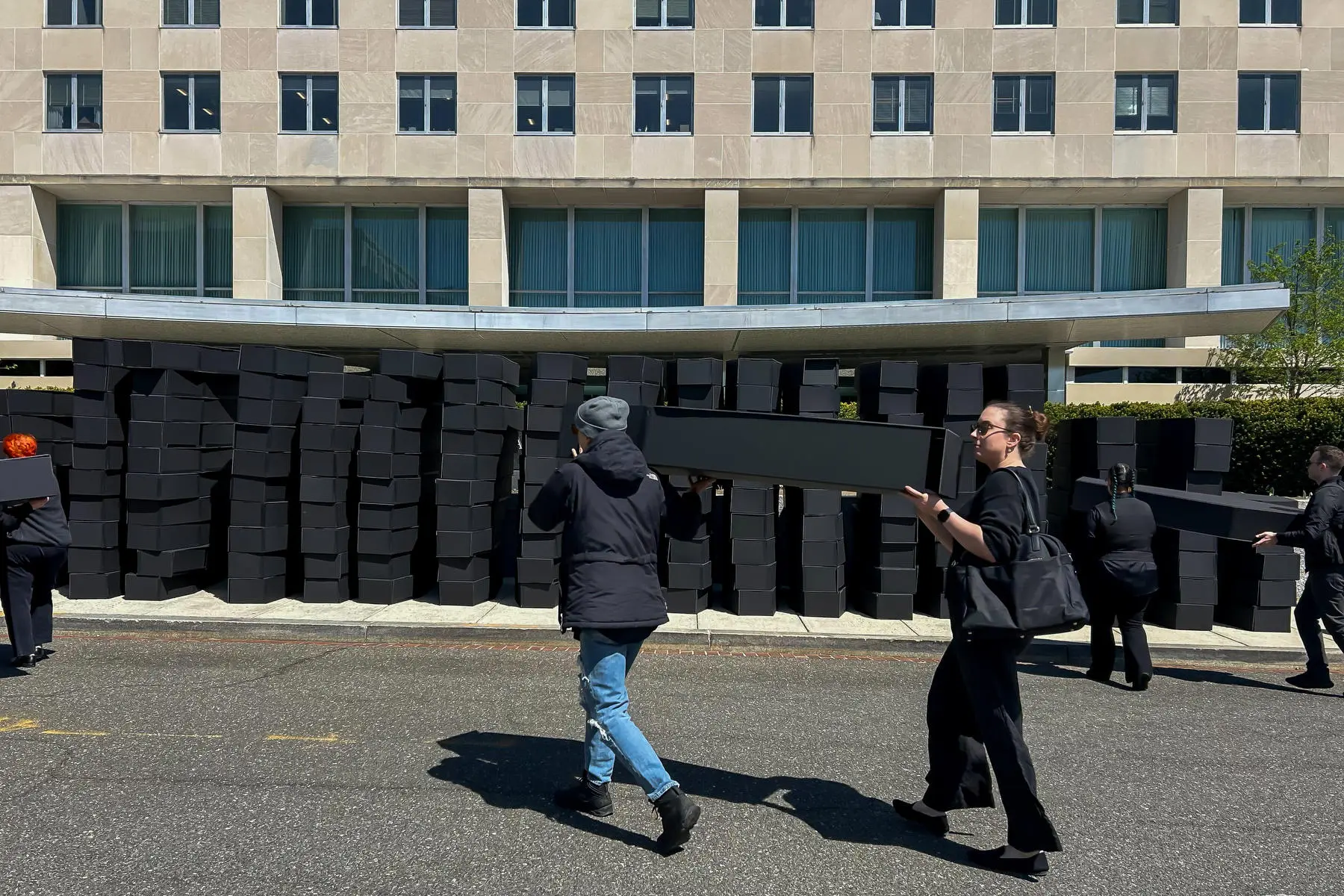
New Poll Is A Disaster For Trump
April 17, 2025
‘I Don’t Want Thick Skin. I Want to Feel People’s Pain’: Rep. Pramila Jayapal on Truth, Power and Breaking the Rules
April 17, 2025WASHINGTON, D.C. — It took Peter Staley two weeks to build 200 full-sized coffins. The longtime AIDS activist, with a group of volunteers, fashioned them out of black styrofoam and strapped them together with tape and velcro. On Thursday morning, the volunteers stacked coffins 10 layers deep outside the State Department headquarters to protest funding cuts to the global program known as PEPFAR, or the U.S. President’s Emergency Plan for AIDS Relief.
“We could see five million deaths in the next five years unless the spigots turn back on — fully, fast,” said Staley, one of the country’s most prominent AIDS activists of the 1980s and ’90s. As a trio of drummers played a funeral march, the procession continued. People dressed in black silently walked back and forth to set down each coffin, some carrying them in pairs. Each one represents 100,000 patients who are on medication provided through PEPFAR and whose lives are at risk under funding cuts, he said.
PEPFAR, the global program announced by President George W. Bush in 2003, has been credited with saving more than 26 million lives through access to antiretrovirals, which suppress the virus, and preventing the spread of HIV in 5 million children, according to the United Nations program on AIDS. As of last year, PEPFAR provided lifesaving HIV treatment for more than 20 million people. Activists said the program is in grave danger under the second Trump administration. Secretary of State Marco Rubio temporarily halted most foreign aid grants in January, and the U.S. Agency for International Development (USAID), which carried out much of the work to provide PEPFAR aid, has largely been dissolved.
Although a limited waiver to PEPFAR was granted on February 1 to resume “urgent life-saving HIV treatment services,” including testing and provision of HIV drugs, activists say that waiver hasn’t actually delivered life-saving aid.
“It’s been impossible to implement. It’s been impossible to operationalize. And when we criticize them, they say, ‘Oh well, but there’s a waiver,’” said Asia Russell, executive director of the advocacy group Health GAP and a longtime AIDS activist. USAID employees were the ones who usually facilitated aid and funds to those countries where PEPFAR operated — but now that the agency has cut nearly all of its workforce, there is no one left to process waiver applications. As of early April, the administration had fired the few health officials left who had overseen care for children and pregnant women living with HIV in low-income countries.

(Orion Rummler for The 19th)
“Two days ago, I received a text message from an AIDS activist in Nigeria,” Charles King, CEO of Housing Works, an HIV/AIDS advocacy nonprofit, told reporters on Thursday. “He wrote to me to say, ‘My medications will run out on April 28th. I’ve been to three different clinics, two of them are closed and the other has no antiretroviral treatment available. Can you please find treatment in the U.S. to send to me?’ I will do my best … but there are over 20 million people running out of treatment every single day.’”
The PEPFAR Impact Counter, compiled by the HIV Modelling Consortium and launched by an associate professor of global health at Boston University, estimates that over 36,000 adults and nearly 4,000 children have died since January as a result of PEPFAR’s partial funding discontinuation. Those deaths could continue: One policy analysis recently published in The Lancet, a medical journal, found that the reduction or elimination of PEPFAR funding could lead to the deaths of nearly 500,000 children in sub-Saharan Africa from AIDS-related causes in the next five years.
“We created a program that brought Democrats and Republicans together to do one thing: save lives,” said Matt Rose, longtime HIV patient advocate and senior public policy advocate for the Human Rights Campaign, the country’s largest LGBTQ+ advocacy organization. “Across a continent, an ocean, a world away, we told people that we cared for them. And in caring for them, we cared for each other. And this administration, in that building, has decided that we do not care anymore.”
-
Read Next:

-
Read Next:
Growing old with HIV is now possible. Trump’s CDC cuts threaten that progress.
The HIV/AIDS activists gathered before the State Department on Thursday demanded an immediate restoration of PEPFAR’s funding and to protect the program from any rescission package that may come within the next fiscal year.
“We know that very little aid is actually reaching PEPFAR programs because the programs have been dismantled, the awards have been terminated, but that money is still there, and the Trump administration needs to get its hands off that money and get it to the people who need it,” Russell said.
Six child-sized coffins were the last to be placed before the State Department’s headquarters. One woman in the crowd, Asia Betancourt, cradled hers close to her chest, as if it really were a child. As she held the empty styrofoam container, she was thinking about cradling her own goddaughter. She died at 10, weighing about 35 pounds, from an opportunistic infection that followed her AIDS diagnosis. This was in the United States.
“None of the medications worked for her,” Betancourt told The 19th. During her time as an AIDS activist in the late ’80s, she said that medications for children were thought of last. Now, she wants those in power to stop more children from dying unnecessarily.
Great Job Orion Rummler & the Team @ The 19th Source link for sharing this story.





